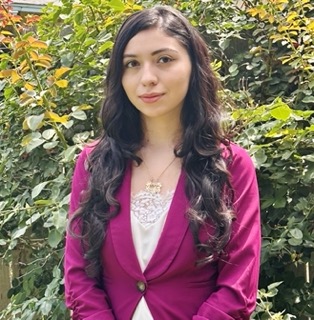 Judith Barrera, M.Ed.
Judith Barrera, M.Ed.
Academic Success Specialist
I grew up in the Dallas area and went to a CTE high school where I studied business. Not everyone in my life supported my goal of going to college. I persevered and worked hard to graduate in the top of my class in high school. I started as a Social Work major but decided to change my major to psychology. The professor I took General Psychology in community college was a UD alumna; she spoke highly about UD’s psychology program and introduced me to psychology as a human science. At UD, I appreciated the individual attention my professors gave me and completed 2 quantitative research projects and a phenomenological senior thesis. I also worked as a research assistant for Dr. Leonard’s Community Assistance Research group. I graduated from UD in 2021, and decided to pursue a master’s degree from Texas A&M University in educational psychology . I worked for the division of Student Life as a graduate assistant for the data analyst while I pursued my degree.
Before college, did you know what you wanted to do?
I had so many ideas about what I wanted to do “when I grew up,” and I surprisingly gained interest in something completely different. I was interested in genetics and considered being a geneticist or genetic counselor. I entered college as a Social Work major, and I wanted to get an MSW to be a counselor. I eventually changed my major to psychology with the idea that I would be a counselor, but I became more interested in social data analytics.
Where did you go to college and how did you achieve that? What was the application process like? Any challenges?
I was admitted into my dream school, but I was not ready to move out. I had recently experienced some life-changing events, and I was not sure what I wanted to do next. I started taking classes in community college. My goal was to earn an associates degree and transfer to UT Arlington to complete my degree in Social Work. I did not experience any challenges in the application process. I attended as many college fairs as I could and was in close contact with my counselors and teachers who helped me through the process. The most difficult part was transferring my community college credits to UD as UD is very selective. I lost many credits, but embraced the opportunity to learn more from the core curriculum. Applying for graduate school was a pretty simple process. One of my psychology professors, Dr. Landrum, and OPCD helped me with my CV and application essay.
What was your motivation during your college years?
My motivation during college was gaining experience in my field of interest that would lead me to a successful career. In the beginning, I cared about my grades and wanted to learn as much as possible. I always took 18 hours per semester. My junior year, I realized how important networking and internships were. I was motivated to do well because I knew that being in my professors and employers’ good side could potentially lead to a good letter of recommendation or they could introduce me to other people who would help my career.
What did you do after graduating from college?
After my undergraduate degree, I started my master’s program in educational psychology at Texas A&M. I enjoyed my program and my graduate assistantship. I now work as an academic success specialist for UD. I love working with all students, but especially enjoy helping commuter students, transfer students, and first-generation students.
What’s some advice you would give to your past self?
Do not let grades determine your self-worth. I used to have an unhealthy relationship with grades and sacrifice sleep, quality time with friends and family, and meals. When I was in graduate school and did more research on inhibitory control, I realized I was just doing myself a disservice. I had to learn how to balance all aspects of my life. I tried my best in school. I learned how to care more about the learning outcomes instead of my grades. I also started focusing more on networking, making friends, working out, and eating healthy.
After having been a first-generation student, how does it affect you today?
Now that I have completed two degrees, I know what I did not know. I have noticed that sometimes first-gen students have a lot of questions but don’t want to ask. I try my best to make first-gen students feel comfortable with me when we have conversations. Even if they don’t ask these obvious questions, I share information with them anyway.
